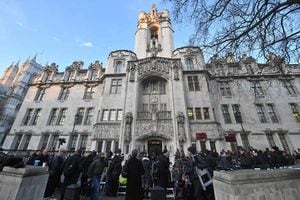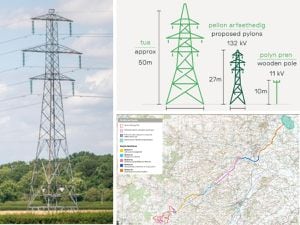Brexit ruling: Shropshire and Mid Wales politicians react as Government loses vote appeal
Shropshire and Mid Wales politicians have reacted to the ruling of the Supreme Court that Parliament must give its approval to trigger the process of leaving the EU.

Supreme Court justices ruled, by a majority of eight to three, that Prime Minister Theresa May cannot lawfully bypass MPs and peers by using the royal prerogative to trigger Article 50 of the Lisbon Treaty and start the two-year process of negotiating the UK's divorce from its EU partners.
However, they unanimously rejected an argument that devolved administrations in Scotland, Wales and Northern Ireland must be consulted before Article 50 is triggered.

Daniel Kawczynski, Shrewsbury and Atcham MP, said: "The vote to pull out of the European Union coupled with this decision by the Supreme Court will lead to the single biggest renaissance of parliamentary sovereignty and authority that I have experienced in my lifetime, and that is something I applaud. Because the ability for this parliament to be seen as directly responsible for all laws and being directly accountable to the people will be clearer than at any time in my lifetime.
"Each member of parliament will have to take their own decision but clearly they will be accountable to the people of their constituency.
"I am in a very fortunate position that my country, my county, and my constituency all voted for Brexit, as did I so I am completely in sync with those three important factors.
"Not everyone is in that fortunate position and they will have to make up their own minds, but ultimately they will have to explain the rationale of what they have done to their constituency.
"I believe if a constituency has voted for Brexit that is a clear demonstration of what they expect their MP to do.
"If Parliament was to somehow try and block Article 50 it would be wholly unacceptable and would cause a constitutional crisis and lead to a General Election."

Ludlow MP Philip Dunne said: "I am disappointed but not surprised that the Supreme Court has upheld the High Court ruling.
"I look forward to the Brexit secretary's statement which will lay out how the Government intends to proceed."

Glyn Davies, Montgomeryshire MP said: "I think it is what we expected.
"I expect that when Parliament resumes a bill will be put forward to take the action to trigger Article 50.
"I fully expect to be voting on Article 50 before the end of March.
"I do think it was interesting to see that three of the judges actually voted with the Government, it suggests it was a fairly fine argument."
Owen Paterson, North Shropshire MP, said: "The fact there was a split vote shows that the government was right to appeal.
"The Government should bring a bill forward as soon as possible, to trigger Article 50 by the end of March."
The ruling is a blow to Mrs May, who has repeatedly said she intends to trigger Article 50 by the end of March following the clear majority in favour of Brexit in the June 2016 referendum.
But she will be buoyed by the decision on the devolved administrations, which could have been much more significant in upsetting her timetable if it had gone the other way.

Telford MP Lucy Allan said: "I will continue to support Brexit. The Prime Minister has handled this issue well and we need to get started for benefit of jobs and business.
"There is a further issue, more important than my own opinion.
"My constituents voted strongly in favour of leaving the EU.
"I knew what local sentiment was on this issue well before I became an MP. That was one of the reasons why I wanted to represent Telford – that I felt in tune with local views and opinions. I got where Telford was coming from.
"It is for this reason that members of Parliament will not vote against Brexit.
"The people have spoken, they were given a yes/no Referendum and we know what they said.
"Parliament cannot in good conscience use Parliament to frustrate the will of the people – that way revolution lies.
"I respect the views of the people and the majority of members do too."
Mark Pritchard, MP for The Wrekin, said: "I respect the independence of the judiciary.
"Parliament will now express the will of the people."
Shropshire UKIP MEP Jill Seymour said: "So now we have the court's decision on the Brexit legal rules - let's get on with it, and give the people what they voted for."
The court case was won by a wide-ranging group of anti-Article 50 campaigners led by investment manager Gina Miller, 51, and hairdresser Deir Dos Santos.
Supreme Court President Lord Neuberger said: "By a majority of eight to three, the Supreme Court today rules that the Government cannot trigger Article 50 without an Act of Parliament authorising it to do so."
Commenting on the ruling, Lord Chancellor Liz Truss defended the independence of the judiciary.
Ministers faced criticism for failing to back the High Court judges when they came under fire from some Brexiteers after their initial ruling last year.
Stressing that the UK would respect the decision of the court, Ms Truss said: "Our independent judiciary is the cornerstone of the rule of law and is vital to our constitution and our freedoms."
Labour leader Jeremy Corbyn said his party would not "frustrate the process for invoking Article 50" but would seek to amend the legislation to prevent the UK becoming a "bargain basement tax haven".
But the Liberal Democrats, who have just nine MPs but more than 100 peers, will vote against Article 50 unless there is a guarantee of the public having a vote on the final deal.
Lord Neuberger said the three dissenting justices considered that the Government could trigger Article 50 without an authorising Act of Parliament.
In their view "Parliament has not imposed any limitation on the Government's prerogative power to withdraw from the Treaties".
Giving a short summary of the court's findings, Lord Neuberger stressed: "The issues in these proceedings have nothing to do with whether the UK should exit from the EU, or the terms or timetable for that exit.
"The main issue is whether the Government can trigger Article 50 without the prior authority of an Act of Parliament.
"The other issues concern the obligations of the UK Government under the devolution legislation before triggering Article 50, and in particular, whether the legislatures in Scotland, Wales and Northern Ireland must be consulted."





